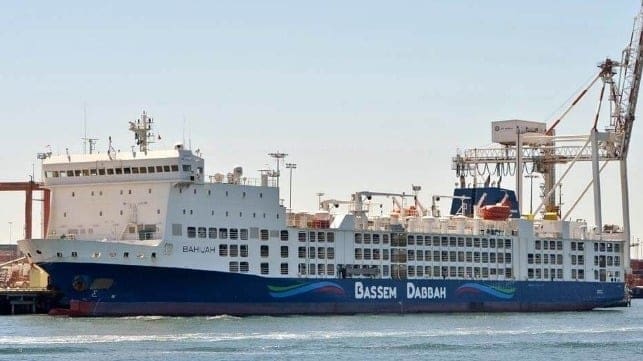 RE-EXPORT of an Israeli-owned vessel’s sheep and cattle shipment from Fremantle in Western Australia is achievable, according to industry stakeholders.
RE-EXPORT of an Israeli-owned vessel’s sheep and cattle shipment from Fremantle in Western Australia is achievable, according to industry stakeholders.
However, RSPCA Australian chief scientist Dr Suzanne Fowler said today the organisation will not support any plan to subject the animals “to yet another prolonged and torturous sea journey”.
Experienced livestock export veterinarian Dr Peter Arnold said there had been other examples of livestock being off-loaded off vessels that returned to Australia before re-export.
The 78 year-old retired veterinarian worked for more than 40 years in the trade and has been long-time supporter of live export.
Before the trade regulator, the Department of Agriculture Fisheries and Forestry, decided last Sunday not to approve the MV Bahijah’s application to re-export its livestock to Israel, Dr Arnold believed the animals had plenty of food, water, ventilation and space on the vessel, currently standing off Fremantle.
“Better than being on a farm. There needs to be a logical outcome. Export them or off load them. Either is ok. Doing nothing is not. The ship itself is a perfect quarantine station. Keep Greenies and inexperienced people away. I am experienced,” Dr Arnold wrote in a comment on Beef Central.
Dr Arnold told Sheep Central Australia had “fantastic quarantine regulation and administration people”, along with the necessary facilities to hold and rest the livestock before re-export.
“We have all the expertise, experience and facilities to do that,” he said.
“It has kept this country free of disease.”
Dr Arnold said he has been amused at the publicity and over-reaction of the government to the vessel’s situation.
“This really is a storm in a teacup because there really is no problem … overseas no problem, look after the animals is an absolute must, get on with it.”
Dr Arnold said elements of the media influenced by animal activists and the RSPCA have been “trying to make something out of this that is really nothing” because the issue is newsworthy.
“If the media can get somebody to pass a comment who has some form of reputation, like the RSPCA or animals rights groups, they will publicise that first.”
Dr Arnold said it has to be appreciated that there are issues like vector and arthropod-borne disease risks to be considered with the livestock returning to Australia “and we have to be careful of that.”
“We can’t be Peter Arnold arrogant and say everything is OK, we have to be a little careful that this can happen, but we have the people with the skills to handle it.”

The MV Bahijah in Fremantle in 2018 (Bahnfrend – CC BY-SA 4.0 DEED)
Shipment’s predicament not unprecedented – ALEC leader

ALEC chief executive officer Mark Harvey-Sutton.
Australian Livestock Exporters Council chief executive officer Mark Harvey-Sutton said there had been instance where vessels carrying cattle had experienced mechanical difficulties and have had to return to Australia.
“I would say instances like this are highly unusual and exceptional, but certainly not unprecedented.
“But this would be the longest voyage that has been returned in the history of the trade.”
The sheep and cattle have been on the MV Bahijah for more than a month since leaving Australia for Israel on 5 January, and then returning under DAFF orders due to tensions in the Red Sea.
DAFF approval to disembark MV Bahijah

WAFarmers Livestock Council president Geoff Pearson.
WAFarmers Livestock Council president Geoff Pearson said the MV Bahijah is waiting for another live export vessel, the Al Messilah, to load sheep before it unloaded its livestock, possibly by the weekend or early next week.
Mr Pearson said once the Al Messilah was loaded there would space in a Baldivis quarantine premises and feedlot to unload the MV Bahijah’s 14,000 sheep and 1500 cattle. He said DAFF has given approval for the exporter Bassem Dabbah to disembark the livestock.
“The livestock will be rested until such time as we can get another permit issued and we will go again.”
Mr Pearson said he was aware of cases where cattle had been unloaded from vessels in northern Australia for later re-export.
“I believe there have been two cattle ships that have been offloaded before in the north, but nothing in the south and no sheep.”
He said DAFF has indicated the MV Bahijah’s livestock carried a low biosecurity risk given they not been on foreign shores and had been in low-risk vector zones hundreds of kilometres for other countries.
Re-export defies common sense – RSPCA
RSPCA Australia chief scientist Dr Suzanne Fowler said the RSPCA is strongly opposed to any proposal to re-export the MV Bahijah animals.
“It absolutely defies common sense that this is even being considered,” she said.
“Given the length of time and amount of stress and fatigue these animals are already suffering, such a move would be unprecedented and extremely dangerous.
“We simply don’t know how much rest could possibly be enough to recover from this ordeal – three months, six months, a year? There’s no evidence and no precedent,” she said.
“To re-export them now would be one massive experiment and surely, these animals should not be exposed to such an unknown and significant risk. They have suffered enough already.”
Dr Fowler said between unloading, adjusting to a new and unfamiliar environment, shearing of the sheep, appropriate vet treatment as needed, and then reloading – the truth is the animals will get very little rest at all.
“It’s a recipe for disaster.
“To subject these animals to another 30+ days of the conditions that are inherent to live export, with sea sickness from the motion of the vessel, increased risk of lameness for cattle who stand for longer than normal, sheep having to stand in their own waste for days on end, and a high risk of heat stress, is an abhorrent suggestion.”
Dr Fowler said the RSPCA has already provided to the department, and will continue to remind them of, the scientific evidence that clearly states that these animals are stressed and fatigued after more than 30 days at sea.
“There is a plethora of available scientific evidence that shows transport by sea is stressful, and that stress can lead to increased risk of disease and suffering for the animals, and further to this, increases risk of death.
“We will continue to call on the exporters to make the right decision here and start making arrangements for the animals to be safely offloaded, using low stress management techniques given the already compromised nature of the animals, and to ensure they are processed humanely on Australian shores,” she said.
“Not only do we not support the re-export of these animals, we call for all shipments to and through the Red Sea to be voluntarily suspended by the exporters, including halting any ill-conceived plans for extended land or sea journeys to try and circumvent this risk – you can read the open letter we’ve addressed to the live export industry today.”
DAFF response
Sheep Central asked DAFF if the rules for live export of animals from Australia encompassed the re-export of sheep and/or cattle after such a lengthy voyage, and/or if there is a minimum time that livestock on a vessel at sea for a month must be rested on shore before being eligible for re-export.
DAFF responded with: “A more detailed statement of reasons underpinning the recent regulatory decision is not yet available, however will be published as soon as possible. We will provide a direct link (as) when this is online.”

The Israelis don’t differ in the treatment of export live animals to the people of Gaza.
Same goes for other exporters of live animals as witnessed onboard the Al Kuwait vessel. ‘Stinking cattle ship leaves Cape.” Mahira Duval February 22, 2024
There is more to looking after live stock and getting them in top condition ready for export in the meat trade, as for example, what happens to these animals after you have safely unloaded them from the boats? If being hog-tied and stuffed into car boots and transported on top of roof racks in extreme hot weather conditions is being concerned about there welfare well I am sorry to say that I think your interest is purely commercial and there is no interest in the welfare of livestock after you have done your job, so maybe we should not leave it to the experts. Sorry but ,I have to give my opinion and I am sure many people will agree with me.
“MV Bahijah”
I am a former quarantine Officer and I am writing this on behalf of myself and also other former quarantine officers who have worked diligently to keep exotic diseases out of this country.
We are very concerned with the government’s decision to allow the unloading of live animals from the livestock vessel “MV Bahijah” in the Port of Fremantle, WA.
The MV Bahijah is currently positioned off the Western Australia coast awaiting further operational instructions.
To date, Australia has maintained a good disease-free status, supported by our stringent quarantine rules. In our view, letting an animal/s back into the country after being on an international ship (particularly as the ship had just come from international waters) poses the real possibility of introducing exotic vectors and arthropod-borne diseases which could seriously jeopardise our quarantine status.
The potential impact of an exotic disease outbreak on the agricultural industry would be disastrous and financially crippling for Australia and indeed the broader farming community.
In the past, some animal species have been imported via Cocos Island and New Zealand where they’ve been held under strict quarantine supervision for the entire incubation period of the potential exotic diseases that the respective animals could carry. As I’ve been out of the ‘game’ for quite a while, I understand that this option is no longer available. I also understand that the only way now to import farm animal species is as breeding material, in the form of embryos or live semen.
Animal importers who have been abiding by these strict quarantine rules must be both furious and disillusioned to hear that some of the animals aboard MV Bahijah have already been unloaded onto WA soil. The primary focus; however, should be the fact that we simply can’t allow any exotic animal or plant disease to come into our country. As previously mentioned, it would severely impact the agricultural industry.
All livestock carrying vessels are cleaned prior to arrival at an Australian port and are inspected ‘at sea’. If they pass quarantine inspection, a permit is issued for the ship to enter port for loading. Should a contamination be found — albeit on rare occasions — the ship is refused entry and ordered out beyond harbor limits, to be re-cleaned and re-inspected prior to entry into port. The MV Bahijah could not possibly have met with this criteria.
With the mere fact that the MV Bahijah was carrying livestock in international waters, there is little doubt that it would have been exposed to foreign ‘flying’ vectors (flies, mosquitos etc). Therefore, by coming back into an Australian port, obviously without the regulatory cleaning and fumigation procedures required under Australian quarantine protocols, numerous vectors are literally on Australian soil. “The cat is literally out of the bag”. It naturally follows that our endemic local vectors now have the ‘perfect gift’ to further spread any introduced viruses and pathogens.
In addition, the manure that would be on the hooves of the unloaded animals obviously leads to soil contamination and animal-to-animal transmission within the on-shore holding facility. This is of great concern to us.
The government just should not let this happen.
Re-export is the only option, whether on the same ship or even if the load is to be shared with another vessel. Give them away to another country experiencing famine. The monetary cost would be miniscule compared to the fiscal costs associated with an exotic disease outbreak in Australia.
In our view, we just cannot allow these animals back. To do so seriously questions the quarantine protocols that we were instructed to uphold and trained to carry out.
Exotic disease prevention must remain a “100 percent no-risk” quarantine policy.
This whole debacle gives little confidence to all parties concerned. For any ship never mind one loaded with animals, flying an Israeli flag to set sail to the Red Sea was plainly stupid in the first place. The Red Sea is a zone known as an area where the Houthis in support of Palestine are targeting ships of American or British origin carrying goods to Israel. All parties should have known that. Rather than being clever this action becomes a further nail in the coffin of the live sheep trade.